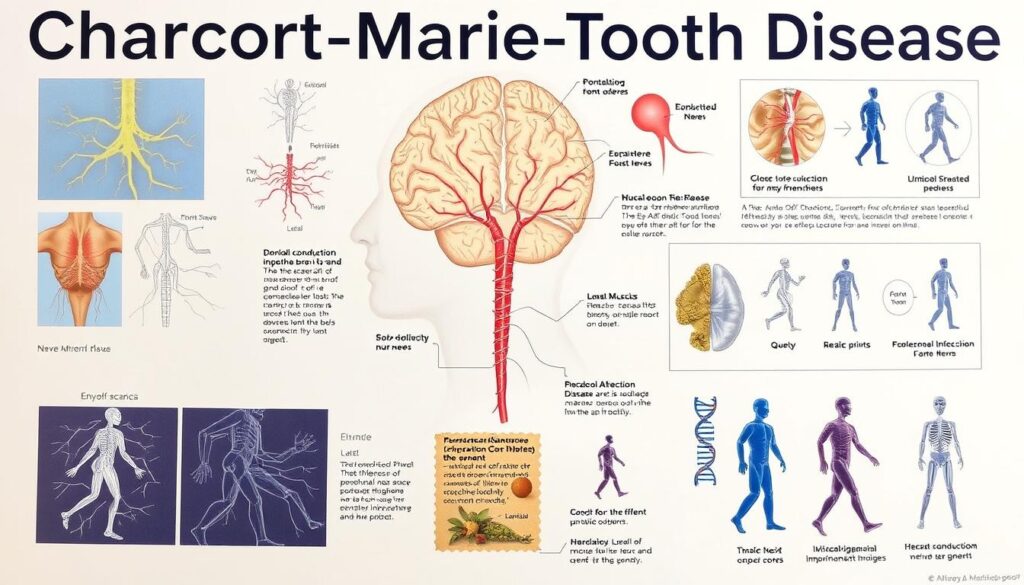Charcot-Marie-Tooth disease (CMT) is a rare inherited neuropathy. It affects how your brain sends signals to your muscles. This condition causes unique challenges for those diagnosed1.
CMT includes over 160 types caused by genetic mutations. It’s a diverse group of inherited neurological conditions1.
Living with CMT makes everyday tasks more demanding. People with CMT use three times more energy for basic activities. The disease can cause foot deformities, chronic pain, and severe fatigue1.
About 126,000 people in the United States have CMT. Worldwide, it affects 2.6 million individuals2. Each person’s experience varies based on their specific genetic mutation and inheritance pattern2.
Key Takeaways
- CMT is a rare inherited neuropathy affecting 1 in 2,500 people
- Over 160 individual types exist with varying genetic mutations
- Daily activities can require significantly more energy for CMT patients
- Multiple inheritance patterns determine disease progression
- Symptoms can include muscle weakness, chronic pain, and fatigue
What is Charcot-Marie-Tooth Disease?
Charcot-Marie-Tooth disease (CMT) is a group of inherited nerve disorders. It affects how your nerves send signals between your brain and body. This genetic condition impacts your nervous system’s communication3.
CMT is a common inherited neurological disorder. It affects about 150,000 people in the United States4. The disease mainly impacts peripheral nerves.
CMT causes progressive muscle weakness and loss of feeling in your limbs5. It’s important to understand its unique features for better management.
Disease Characteristics
CMT has several key features:
- Genetic mutations affecting nerve function3
- Progressive muscle atrophy in legs and arms
- Potential foot deformities and mobility impairment5
Types and Genetic Variations
Scientists have found multiple types of CMT. There are over 30 known genetic causes3. The most common types include:
- CMT1: Typically involving myelin sheath damage4
- CMT2: Characterized by axonal neuropathies4
- CMTX: An X-linked inherited form
Early Symptoms and Progression
CMT symptoms usually start in teenage years or early adulthood. You might notice weakness in foot and lower leg muscles. Walking difficulties and reduced feeling in hands and feet are common3.
As CMT progresses, symptoms can spread to your hands and arms5. Understanding your specific type of CMT is crucial.
“Knowledge is the first step in managing Charcot-Marie-Tooth disease effectively.”
There’s no cure for CMT. However, knowing your type can help create effective management strategies. Work with healthcare professionals to develop the best plan for you3.
Managing Your Condition
Charcot-Marie-Tooth (CMT) needs a thorough approach to manage health and maintain life quality. Understanding diagnosis and treatment options helps you control your condition.
Diagnosis and Testing
Identifying CMT involves a detailed medical assessment. Genetic testing confirms your specific type of CMT6.
Doctors use several diagnostic methods:
- Comprehensive neurological examination
- Family medical history review
- Nerve conduction studies to assess nerve function
- Genetic blood tests to detect inherited mutations6
Treatment Options
No cure exists for CMT. However, many strategies can help manage symptoms and improve daily functioning.
| Treatment Approach | Primary Benefits |
|---|---|
| Physical Therapy | Prevent muscle tightening, maintain strength6 |
| Orthopedic Devices | Improve mobility, prevent injuries7 |
| Pain Management | Control muscle and joint discomfort6 |
Supportive Therapies
Care extends beyond medical treatments. Occupational therapy helps maintain independence by developing strategies for daily tasks8.
Consider these supportive approaches:
- Custom orthoses and assistive devices
- Low-impact exercises like swimming and biking6
- Adaptive tools for improved hand function
- Support groups for emotional support6
Research explores potential treatments, including stem cell therapies and gene interventions7. Stay informed and work with your healthcare team to develop an effective management plan.
Living with Charcot-Marie-Tooth Disease
Living with Charcot-Marie-Tooth disease requires smart planning and flexibility. You’ll need to understand how mobility issues affect daily tasks. Develop coping strategies to maintain independence as the condition progresses9.
Emotional support is key when facing CMT challenges. Many people feel discouraged and isolated. Joining online support networks can offer comfort and useful tips10.
Professional counseling can boost your resilience. It helps manage the mental impact of CMT9.
Assistive devices can improve your daily life. The Americans with Disabilities Act protects your work opportunities10. The Charcot-Marie-Tooth Association offers research and support networks10.
Take charge of your CMT management. Talk often with your doctors about treatment options. Stay connected with support groups to keep a positive outlook9.
FAQ
What exactly is Charcot-Marie-Tooth Disease (CMT)?
How do I know if I might have CMT?
Is there a cure for Charcot-Marie-Tooth Disease?
How is CMT diagnosed?
Can CMT be inherited?
How does CMT progress over time?
What support is available for people with CMT?
Can lifestyle modifications help manage CMT?
Source Links
- What is Charcot-Marie-Tooth disease (CMT)? – https://www.cmtausa.org/understanding-cmt/what-is-cmt/
- Charcot-Marie-Tooth Disease – https://www.ninds.nih.gov/health-information/disorders/charcot-marie-tooth-disease
- Charcot-Marie-Tooth Disease – https://www.hopkinsmedicine.org/health/conditions-and-diseases/charcotmarietooth-disease
- Charcot-Marie-Tooth disease: MedlinePlus Genetics – https://medlineplus.gov/genetics/condition/charcot-marie-tooth-disease/
- This inherited disease weakens muscles and affects quality of life but doesn’t affect life span.-Charcot-Marie-Tooth disease – Symptoms & causes – Mayo Clinic – https://www.mayoclinic.org/diseases-conditions/charcot-marie-tooth-disease/symptoms-causes/syc-20350517
- This inherited disease weakens muscles and affects quality of life but doesn’t affect life span.-Charcot-Marie-Tooth disease – Diagnosis & treatment – Mayo Clinic – https://www.mayoclinic.org/diseases-conditions/charcot-marie-tooth-disease/diagnosis-treatment/drc-20350522
- Charcot-Marie-Tooth disease – Treatment – https://www.nhs.uk/conditions/charcot-marie-tooth-disease/treatment/
- Medical Management – Charcot-Marie-Tooth Disease (CMT) – Diseases | Muscular Dystrophy Association – https://www.mda.org/disease/charcot-marie-tooth/medical-management
- Charcot-Marie-Tooth disease – https://www.nhs.uk/conditions/charcot-marie-tooth-disease/
- Living with Charcot-Marie-Tooth Disease (CMT) –… – https://charcot-marie-toothnews.com/living-with-charcot-marie-tooth-disease-cmt/
